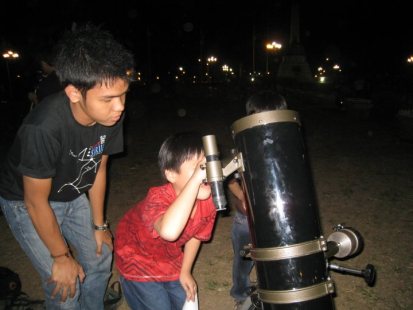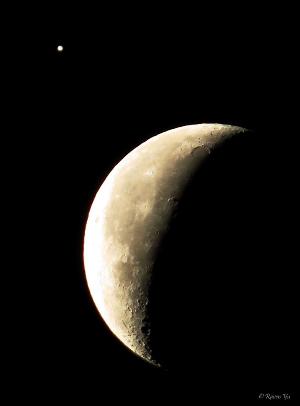by Raven Yu
- Published: Wednesday, April 24 2013 06:00
Astronomy is a very interesting field. From the craters on our moon, the wonderful cluster of stars, to the solar prominences of our Sun -- I find these things simply amazing. Since early times, people have been interested in observing and learning about the Universe. Today many people enjoy astronomy as a hobby and some even go on to astronomy as a career. But aside from scientists, people from many professions can now become involved in the study of the Universe and make important contributions.

Getting involved in astronomy can happen on many levels. You can admire the stars with a group of like-minded amateur astronomers, take courses at the college or university level or even participate in astronomical research.
Observe from your own backyard
Astronomy doesn't need to involve sophisticated, expensive equipment or any equipment at all. In fact - some basic information and activities can help you to enjoy astronomy as a hobby from your own backyard or nearby. Some of the many things that you can see from your own backyard include the changing phases of the moon, and various star positions. You can observe the various constellations in the sky during different seasons of the year, and things like the Big and Little Dippers. You can also see Messier objects with the naked eye.
More amateur astronomers nowadays also engage in astrophotography. Pictures of the objects that you can observe in the night sky can be taken through a telescope using either a traditional camera, or a digital camera with pleasing results.
The best way to learn your sky is to find some good, clear, dark skies, and to get out there and explore it! Bright lights from street lamps, buildings, houses and other sources inhibit the light from objects in space, making them more difficult to see.
Join amateur astronomy clubs
As with any hobby, amateur astronomy can seem a little intimidating for those who are just beginning. Beginners can have a lot of questions about astronomy as a hobby and about astronomy in general. Assuming that you have no background in math, no background in physics, and that you’re interested in exploring the Universe, and possibly contributing to what we scientifically know. The first thing to do is visit your local amateur astronomy club. Go to observing sessions, try others' telescopes, attend lecture series, workshops and more. You will learn a lot.

Free telescope viewing by astronomy clubs during the celebration of the National Astronomy Week in the Philippines (NAW) in February 2011. Image credit: Julee Olave
Astronomy online
Astronomy is becoming more and more accessible through online networking. Get to meet people who share your astronomical passion and discuss theories, new astronomy discoveries and your amateur astronomy sightings. Find the best astronomy websites, top astronomy products, buy the cheapest accessories deals, find new and used telescopes and watch and upload your astronomy videos.
A lot of astronomy clubs, including my home club in the Philippines – the University of the Philippines Astronomical Society, are working on attracting new members and are taking advantage of as many communication avenues as possible, including social networks. Professional observatories, working on public outreach as part of their mission, are also using social networking as a tool to communicate with other professionals and with the public.
There are also online course platform like Coursera, which provides free online courses in topics including Astronomy. Various universities from all over the globe have agreed to bring their courses online through Coursera. If you want to learn more about our Universe or refresh your astronomical knowledge, you can enroll in one of its astronomy classes.
These are great times for astronomy enthusiasts who want to keep up with what’s going on. The problem may be that there is too much information coming our way. You have to be selective about what you pay attention to.
Contributing data to research
Astronomy is unusual among sciences in that amateurs have an honored place alongside professionals. In some areas, such as comet and nova spotting, professionals have always relied on specialists and expert amateurs to hold the front line. In this field, anyone can participate and even make useful discoveries! Amateur astronomers, often using only a pair of good binoculars, have discovered numerous comets. By using more powerful telescopes, amateur astronomers have discovered novae and supernovae. Many people build their own telescopes and observatories to study and photograph objects in the universe. But now, not only those who have telescopes can make valuable contributions in Astronomy. Anyone with a computer can also participate. Join SETI's search for life in the universe, classify galaxies and other space objects through the Galaxy Zoo Project, and more.

Moments before the occultation of Jupiter by the Moon in August 2012. Accurate timing of lunar occultations is performed (primarily) by amateur astronomers.
Be a professional astronomer
Anyone can be an amateur astronomer. All you need is a telescope or binoculars! Or maybe just your eyes! It takes a lot of studying, however, to be a professional astronomer. By "professional," I mean someone who does research, publishes in the professional journals, and teaches at a university, and so on. First you must go through college to get your B.S. degree. Most astronomers these days get a degree in physics, plus lots of courses in math and astronomy. Then you go to graduate school. It usually takes several years in school. It sounds like a lot of work, but if you like it then it doesn't matter!
Astronomy for me is visually exciting, and intellectually challenging. Just always remember to have fun and really enjoy what you see and what you do.
# # #
 Raven Yu is an amateur astronomer and blogger from the Philippines. Having been interested in astronomy since childhood, she joined the University of the Philippines Astronomical Society (U.P. Astrosoc) while completing her bachelor’s degree. She served as an executive officer of the organization and became editor-in-chief of its official publication, The Sidereal Times. Some of the things she enjoys as an amateur astronomer include astrophotography, and promoting astronomy through her astronomy blog (Journey to the Stars). While her main interest is communicating astronomy through the use of the Internet, she has taken part in many other activities, including giving lectures for school students and amateur astronomers, participating in local astronomy events, and sharing the wonders of the sky through public astronomy outreach programs.
Raven Yu is an amateur astronomer and blogger from the Philippines. Having been interested in astronomy since childhood, she joined the University of the Philippines Astronomical Society (U.P. Astrosoc) while completing her bachelor’s degree. She served as an executive officer of the organization and became editor-in-chief of its official publication, The Sidereal Times. Some of the things she enjoys as an amateur astronomer include astrophotography, and promoting astronomy through her astronomy blog (Journey to the Stars). While her main interest is communicating astronomy through the use of the Internet, she has taken part in many other activities, including giving lectures for school students and amateur astronomers, participating in local astronomy events, and sharing the wonders of the sky through public astronomy outreach programs.








Comments